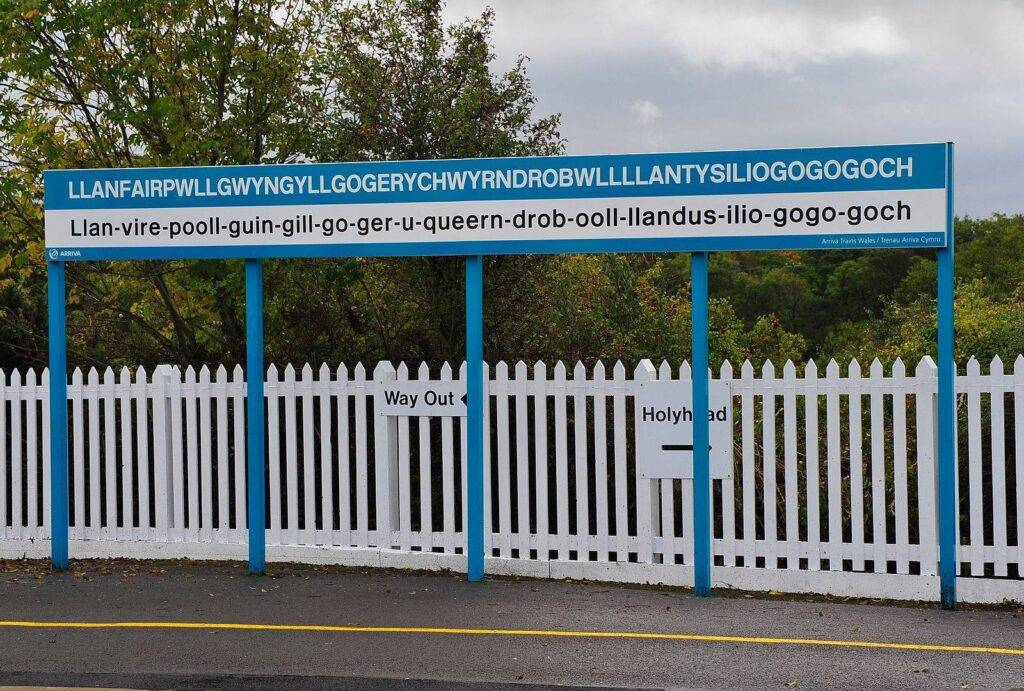No, the title of the post is not a typo. Llanfairpwllgwyngyllgogerychwyrndrobwllllantysiliogogogoch is the name of a village in northwest Wales. At 58 letters, it is the longest officially recognized place name in the United Kingdom and one of the longest in the world.
I have seen slightly different translations of the Welsh name into English, but the most common is “Saint Mary’s Church in the hollow of the white hazel near a rapid whirlpool and the Church of St. Tysilio of the red cave.” And Shakespeare asked, “What’s in a name?”
It certainly is a mouthful, but for Liam Dutton, a weatherman with Channel 4 in the UK, it’s no trouble at all.
Well done, Liam. His cool rendition of Llanfair … of the name … has turned him into an internet celebrity. And he has given us an important lesson.
When you have the responsibility to introduce people, make sure that you know the proper pronunciation of their names. That goes for place names, company names and any proper name.
Check with people who know. On the day of the event, arrive early and confirm any difficult pronunciations with the people whom you will be introducing. If a name is particularly challenging, print it out phonetically on your notes. You owe it to those whom you are introducing to get it right.
I once moderated a panel discussion following the Continental European premiere of the documentary Out to Win. The names of the three people on the panel were not straightforward names for a native English speaker. I made sure to check with the organizers and also with each panel member before the event.
So do your homework. It’s the professional and courteous thing to do. The people whom you introduce and the audience will appreciate it.
As for Llanfairpwllgwyngyllgogerychwyrndrobwllllantysiliogogogoch, at 58 letters, it is still dwarfed by the record holder, this 85-letter monster from New Zealand: Taumatawhakatangihangakoauauotamateaturipukakapikimaunga-horonukupokaiwhenuakitanatahu.
In Maori, it means “The summit where Tamatea, the man with the big knees, the climber of mountains, the land-swallower who travelled about, played his nose flute to his loved one.”

















6 Replies to “Llanfairpwllgwyngyllgogerychwyrndrobwllllantysiliogogogoch”
Great post! Always good to be bi- tri -or quatro lingual, then it is easier to pronounce foreign names.
By the way: English is the only language where the A is pronounced ae like Emeritus.
A in all other languages is pronounced like Avocado, Arcade, Argument
Thanks for the comment, Renate. I agree with you. I have always loved learning languages and speak a few. Great insight on the pronunciation of the letter “A”.
Dear John,
You may remember me. I am that attorney now living in Las Vegas, NV. I saw the BBC weatherman’s original broadcast and was duly impressed. I had not guessed at the use of a typical Welsh “guttural” sound in the pronunciation. It reminded me of the Edith Piaf and Jacques Brel rear tongue “growl” sound they sometimes brought to their singing poetry. Language meets and greets the Mouth.
I guess I was “public speaking” when I lectured some young people on their inherent ability of spell and write. Tactics already possessed and just needed to use in order to break the code of anything that appeared too “opaque,” if only though its shear length. [How was that for a long rambling sentence]. I explained how to break down: Pneumonoultramicroscopicsilico-volcanoconiosis into “bite-sized” pieces.
Otherwise, I have been using a number of your suggestions with both juries and bankers. Talk about tough audiences. The 10 minute/2 minute rest pacing and a “personalized leaving message” have been particularly helpful and effective.
Being an architect, also. I have been providing an 11″ x 17″ “architectural styled drawing of my presentation points as a take away. It even has a typical “title block” at the lower right hand side. Now, all I need is an red circular “Approved Stamp.” Apologies for all the “quotation marks.”
I trust this finds you and your family doing well.
Best,
Anderson
Good one, John. The Welsh apparently take joy in these things. They even named a town “Mumbles.”
Thanks, Jack. I once lived not far from a town called “Lively”.
Anderson, great to hear from you. Thanks for the detailed message. Glad that you are finding the blog helpful. Having practiced law for many years, I can imagine how welcome your legal arguments must be to judges who are probably used to hearing something more mundane. A legal argument in court is a form of public speaking like any other and there are things that speakers (i.e., lawyers) can and should do to get their points across more memorably and convincingly.
All the best going forward and many thanks for the kind contribution to the blog. It is appreciated.